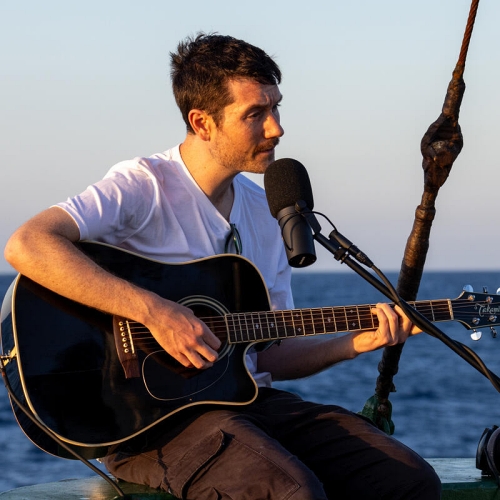The singer, who wrote hits such as Pompeii and Happier, and recently worked with Hans Zimmer on the Planet Earth III score, joined a voyage with Greenpeace UK on the ship the Arctic Sunrise to learn more about the importance of ocean protection.[1] The location in the Sargasso Sea was chosen because scientists have long recognised it as an area rich in marine life that needs greater protection from industrial fishing, shipping and other threats.[2]
The video shows Dan Smith sitting on the prow of the iconic Greenpeace ship playing an acoustic guitar as the sun sinks into the deep blue water of the ocean all around him. Blue Sky & the Painter is a preview of a new song by Dan Smith of Bastille[3]. The accompanying video is available to watch below.
Dan Smith said: “The song is about Edvard Munch finally seeing a crack of light in life after a long period of darkness, and it felt like a theme that resonated with this particular opportunity that we now have to protect these vast blue spaces that we all depend on. I was invited onto this iconic ship to learn and help out, but when we found ourselves in unusually calm water within the Bermuda Triangle, 240 nautical miles away from the nearest land, it just felt like an ideal opportunity to collaborate with the crew on capturing this song.”
Dan spent three busy days onboard the Arctic Sunrise taking part in scientific research, helping to spot humpback whales, and deploying an underwater microphone to pick up the sounds of whales, dolphins and other sea creatures. He also assisted with taking seawater samples from 30m below the surface to test for the DNA traces of marine animals, and took part in a beach clean on Cooper’s Island in Bermuda.
Dan supported the launch of an open letter to the next UK government calling on them to lock into law the Global Ocean Treaty that world governments agreed at the UN last year, and to propose the Sargasso Sea as the first ocean sanctuary under that Treaty.[4] The landmark agreement is the only way to protect at least 30% of the world’s oceans by 2030 – the minimum that scientists agree will allow the oceans to recover after centuries of neglect.
Smith added: “Like so many of us, I’m really worried about climate change and massively keen to know how I can be useful. It’s been so interesting to learn that the oceans are one of our best defences against climate change, and I wanted to bring people along on this amazing adventure that I’ve been lucky enough to be part of. Anyone and everyone can sign Greenpeace’s open letter to the next government, which calls on them to take the Global Ocean Treaty through our Parliament and commit it into law by the end of this year. It’s something positive that can easily happen, and will genuinely have a positive impact. It’ll only take a minute to help by signing this letter, which I think is brilliant for people who are looking for ways to be proactive.”
The Sargasso Sea supports a plethora of iconic wildlife including humpback whales, dolphins and sharks. Its floating mats of golden sargassum seaweed provide a nursery for baby sea turtles and a haven for seabirds and endangered European eels on their epic migrations across the Atlantic. But it also faces many threats – from industrial fishing to climate change and the prospect of deep sea mining.
Fiona Nicholls, an Oceans Campaigner at Greenpeace UK, said: “Dan performed this song of hope and resilience amid the bright blue waters of the Sargasso Sea – waters that are being heated by a changing climate and depleted by industrial fishing. His performance sums up our optimism that protecting our blue planet is possible with the help of the Global Ocean Treaty. This historic agreement was years in the making – before the end of this year our incoming government needs to sign it into UK law to kickstart ocean protection on a global scale. As the song goes… it’s about damn time.”
New figures released by Greenpeace UK last week reveal the Sargasso Sea is a ‘Wild West’ for industrial fishing and shipping.[2] The volume of ships crossing the Sargasso increased by more than 30% since 2018 to over 7,000 vessels last year. Industrial fishing fleets spent a combined total of more than 22,000 hours operating in the sea, mainly dragging longlines that are associated with high levels of bycatch of marine mammals, turtles, seabirds and sharks.
Greenpeace UK is asking the public to follow Dan Smith’s lead and sign an open letter demanding that the incoming government signs the Global Ocean Treaty into UK law without delay, and champions the Sargasso Sea as the first in a new generation of ocean sanctuaries.
